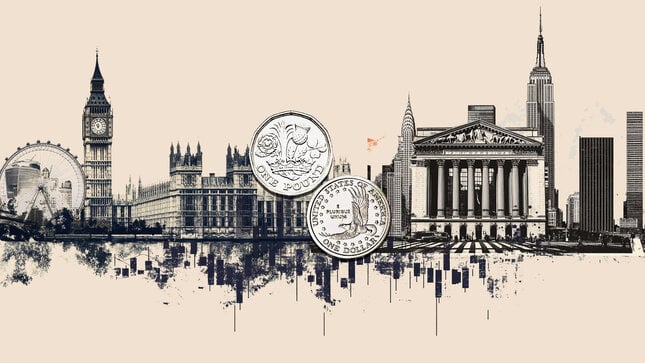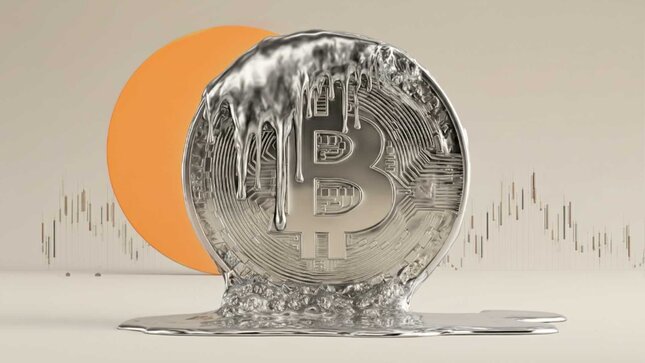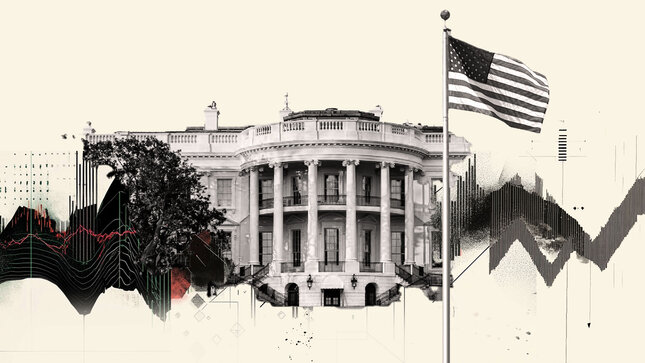The valuation of a currency is determined by a variety of factors, including monetary policy, economic data, and geopolitical events. These three forces interact in a complex and ever-changing way, making it difficult to predict how they will affect the value of a currency in the future.
Monetary policy is the actions taken by a country's central bank to influence the supply of money and credit in the economy. By raising or lowering interest rates, central banks can make their currency more or less attractive to investors. For example, if a central bank raises interest rates, it can make that country's currency more attractive to investors, which can lead to an increase in its value.
Economic data is information that is collected and analysed to measure the performance of an economy. This data can include things like GDP growth, inflation, and unemployment. Changes in economic data can have a significant impact on the value of a currency. For example, if a country's GDP growth is strong, it can make that country's currency more attractive to investors, which can lead to an increase in its value.
Geopolitical events are events that occur at the international level, such as wars, natural disasters, and political upheaval. These events can also have a major impact on the value of a currency. For example, if there is a war in a country, it can lead to a decrease in the value of that country's currency.
By understanding how these factors interact, we can better understand the forces that shape the value of currencies and make informed decisions about currency trading.
Monetary policy
Monetary policy is the actions taken by a country's central bank to influence the supply of money and credit in the economy. The goal of monetary policy is to achieve a stable economy with low inflation and high employment.
The tools of monetary policy
There are a variety of tools that central banks can use to implement monetary policy. These tools include:
-
Open market operations: The central bank buys and sells government bonds in the open market. When the central bank buys bonds, it injects money into the economy. When the central bank sells bonds, it withdraws money from the economy.
-
The discount rate: The discount rate is the interest rate that the central bank charges banks for loans. When the central bank raises the discount rate, it makes it more expensive for banks to borrow money. This can help to slow down the economy. When the central bank lowers the discount rate, it makes it cheaper for banks to borrow money. This can help to stimulate the economy.
-
Reserve requirements: Reserve requirements are the amount of money that banks are required to keep on hand. When the central bank raises reserve requirements, it makes it more difficult for banks to lend money. This can help to slow down the economy. When the central bank lowers reserve requirements, it makes it easier for banks to lend money. This can help to stimulate the economy.
The use of monetary policy
In 2008, the United States experienced a financial crisis that led to the Great Recession. The Federal Reserve responded to the crisis by implementing a number of monetary policy measures, including:
-
Quantitative easing: The Fed purchased trillions of dollars of U.S. Treasury securities and mortgage-backed securities. This increased the money supply and helped to lower interest rates.
-
The discount rate: The Fed lowered the discount rate to near zero. This made it cheaper for banks to borrow money from the Fed.
-
Reserve requirements: The Fed lowers reserve requirements. This made it easier for banks to lend money.
These monetary policy measures helped to stabilise the financial system and to stimulate the economy. The economy began to recover and the Great Recession ended in 2009.
Economic data
Economic data is information that is collected and analysed to measure the performance of an economy. It can be used to track economic growth, inflation, unemployment, and other important indicators.
Types of economic data
There are many different types of economic data. Some of the most common types of economic data include:
-
Gross domestic product (GDP): GDP is the total value of all goods and services produced in a country in a given year. It is a measure of the size of an economy.
-
Inflation: Inflation is the rate at which prices for goods and services are rising. It is a measure of the cost of living.
-
Unemployment: Unemployment is the percentage of the labor force that is unemployed. It is a measure of the health of the labor market.
-
Interest rates: Interest rates are the prices charged for borrowing money. They are a key factor in economic growth and inflation.
-
Exchange rates: Exchange rates are the prices of one currency in terms of another. They are a key factor in international trade.
Importance of economic data
Economic data is important because it can be used to:
-
Track the performance of an economy: Economic data can be used to track the performance of an economy over time. This information can be used to identify trends and make predictions about future economic conditions.
-
Make predictions about future economic conditions: Economic data can be used to make predictions about future economic conditions. This information can be used by businesses to make decisions about investment and hiring. It can also be used by policymakers to make decisions about fiscal and monetary policy.
-
Compare the performance of different economies: Economic data can be used to compare the performance of different economies. This information can be used by investors to make decisions about where to invest their money. It can also be used by policymakers to make decisions about trade policy.
Example
In 2021, the unemployment rate in the eurozone fell to 6.8%, which was the lowest level since 2008. This led to a strengthening of the euro, which rose from $1.18 to $1.22.
On the other hand, in 2020, the unemployment rate in the eurozone rose to 8.1%, which was the highest level since 2012. This led to a weakening of the euro, which fell from $1.12 to $1.08.
Geopolitical events
Geopolitical events are events that occur in the world that have a significant impact on the relationships between countries. They can include things like wars, invasions, coups, and natural disasters. Geopolitical events can have a major impact on the global economy, security, and politics.
Types of geopolitical events
There are many different types of geopolitical events. Some of the most common geopolitical events include:
-
Wars: Wars are armed conflicts between two or more countries. They can be fought for a variety of reasons, such as territory, resources, or ideology. Wars can have a devastating impact on the countries involved, both in terms of human life and economic damage.
-
Invasions: Invasions are when one country sends its military forces into another country without permission. Invasions can be used to conquer territory, overthrow a government, or protect a country's interests. Invasions can also lead to war.
-
Coups: Coups are when a group of people overthrow the government of a country. Coups can be motivated by a variety of factors, such as political ideology, economic interests, or personal ambition. Coups can have a significant impact on the stability of a country and its relations with other countries.
-
Natural disasters: Natural disasters are events that are caused by nature, such as earthquakes, hurricanes, and floods. Natural disasters can have a devastating impact on the countries they occur in, both in terms of human life and economic damage.
Impact of geopolitical events
Geopolitical events can have a major impact on the global economy, security, and politics. They can lead to war, instability, and economic damage. Geopolitical events can also have a significant impact on the lives of ordinary people.
Example
Australia is a country that is prone to natural disasters, such as bushfires, floods, and cyclones. These disasters can have a significant impact on the Australian economy, and they can also lead to a repricing of the Australian dollar (AUD).
In 2019, the country was ravaged by bushfires that destroyed millions of hectares of land and killed over 30 people. The bushfires had a significant impact on the Australian economy, and they also led to a decline in the value of the AUD. The AUD fell by more than 2% against the US dollar in the days and weeks following the bushfires.
Geopolitical events are a complex and ever-changing landscape. They can have a major impact on the global economy, security, and politics. It is important to be aware of these events and to understand their potential impact.
The valuation of a currency is a complex and ever-changing process. It is influenced by a variety of factors, including monetary policy, economic data, and geopolitical events. By understanding how these factors interact, we can better understand the forces that shape the value of currencies and make informed decisions about currency trading.
It is important to remember that the value of a currency is not always predictable. Unexpected events, such as a natural disaster or a political upheaval, can have a significant impact on the value of a currency. As a result, it is important to be aware of the risks involved in currency trading and to only invest what you can afford to lose.
Note: All information on this page is subject to change. The use of this website constitutes acceptance of our user agreement. Please read our privacy policy and legal disclaimer. Opinions expressed at FXstreet.com are those of the individual authors and do not necessarily represent the opinion of FXstreet.com or its management. Risk Disclosure: Trading foreign exchange on margin carries a high level of risk, and may not be suitable for all investors. The high degree of leverage can work against you as well as for you. Before deciding to invest in foreign exchange you should carefully consider your investment objectives, level of experience, and risk appetite. The possibility exists that you could sustain a loss of some or all of your initial investment and therefore you should not invest money that you cannot afford to lose. You should be aware of all the risks associated with foreign exchange trading, and seek advice from an independent financial advisor if you have any doubts.
Editors’ Picks

EUR/USD: Yes, the US economy is resilient – No, that won’t save the US Dollar Premium
Some impressive US data should have resulted in a much stronger USD. Well, it didn’t happen. The EUR/USD pair closed a third consecutive week little changed, a handful of pips above the 1.1800 mark.

Gold: Metals remain vulnerable to broad market mood Premium
Gold (XAU/USD) started the week on a bullish note and climbed above $5,000 before declining sharply and erasing its weekly gains on Thursday, only to recover heading into the weekend.

GBP/USD: Pound Sterling remains below 1.3700 ahead of UK inflation test Premium
The Pound Sterling (GBP) failed to resist at higher levels against the US Dollar (USD), but buyers held their ground amid a US data-busy blockbuster week.

Bitcoin: BTC bears aren’t done yet
Bitcoin (BTC) price slips below $67,000 at the time of writing on Friday, remaining under pressure and extending losses of nearly 5% so far this week.

US Dollar: Big in Japan Premium
The US Dollar (USD) resumed its yearly downtrend this week, slipping back to two-week troughs just to bounce back a tad in the second half of the week.
RECOMMENDED LESSONS
Making money in forex is easy if you know how the bankers trade!
I’m often mystified in my educational forex articles why so many traders struggle to make consistent money out of forex trading. The answer has more to do with what they don’t know than what they do know. After working in investment banks for 20 years many of which were as a Chief trader its second knowledge how to extract cash out of the market.
5 Forex News Events You Need To Know
In the fast moving world of currency markets where huge moves can seemingly come from nowhere, it is extremely important for new traders to learn about the various economic indicators and forex news events and releases that shape the markets. Indeed, quickly getting a handle on which data to look out for, what it means, and how to trade it can see new traders quickly become far more profitable and sets up the road to long term success.
Top 10 Chart Patterns Every Trader Should Know
Chart patterns are one of the most effective trading tools for a trader. They are pure price-action, and form on the basis of underlying buying and selling pressure. Chart patterns have a proven track-record, and traders use them to identify continuation or reversal signals, to open positions and identify price targets.
7 Ways to Avoid Forex Scams
The forex industry is recently seeing more and more scams. Here are 7 ways to avoid losing your money in such scams: Forex scams are becoming frequent. Michael Greenberg reports on luxurious expenses, including a submarine bought from the money taken from forex traders. Here’s another report of a forex fraud. So, how can we avoid falling in such forex scams?
What Are the 10 Fatal Mistakes Traders Make
Trading is exciting. Trading is hard. Trading is extremely hard. Some say that it takes more than 10,000 hours to master. Others believe that trading is the way to quick riches. They might be both wrong. What is important to know that no matter how experienced you are, mistakes will be part of the trading process.
The challenge: Timing the market and trader psychology
Successful trading often comes down to timing – entering and exiting trades at the right moments. Yet timing the market is notoriously difficult, largely because human psychology can derail even the best plans. Two powerful emotions in particular – fear and greed – tend to drive trading decisions off course.


